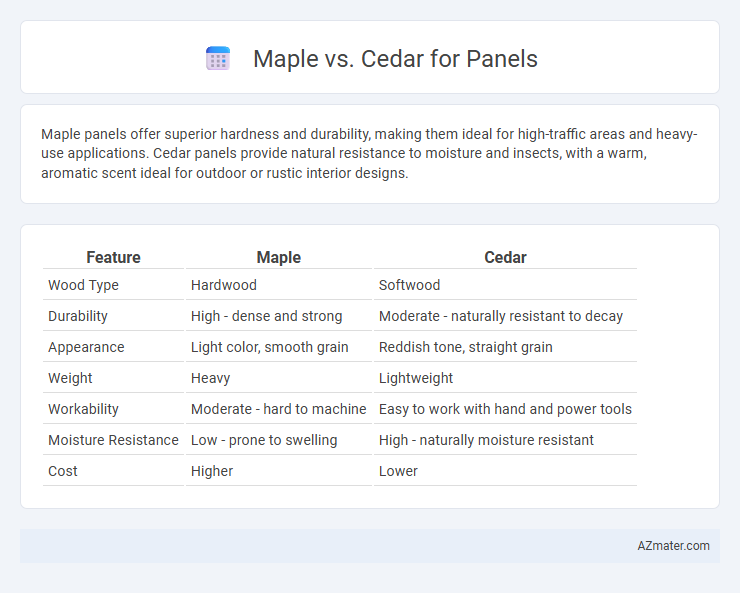Maple panels offer superior hardness and durability, making them ideal for high-traffic areas and heavy-use applications. Cedar panels provide natural resistance to moisture and insects, with a warm, aromatic scent ideal for outdoor or rustic interior designs.
Table of Comparison
| Feature | Maple | Cedar |
|---|---|---|
| Wood Type | Hardwood | Softwood |
| Durability | High - dense and strong | Moderate - naturally resistant to decay |
| Appearance | Light color, smooth grain | Reddish tone, straight grain |
| Weight | Heavy | Lightweight |
| Workability | Moderate - hard to machine | Easy to work with hand and power tools |
| Moisture Resistance | Low - prone to swelling | High - naturally moisture resistant |
| Cost | Higher | Lower |
Introduction to Maple and Cedar Panels
Maple panels are prized for their fine, consistent grain and smooth texture, making them ideal for cabinetry and furniture with a polished finish. Cedar panels offer natural resistance to decay and insect damage, featuring a distinctive aroma and rich reddish-brown hues that enhance outdoor and rustic applications. Both wood types provide durable, versatile options, with maple emphasizing strength and aesthetic neutrality, while cedar excels in resilience and distinctiveness.
Key Characteristics of Maple Wood
Maple wood is known for its fine, uniform texture and light, creamy color, making it ideal for smooth, elegant paneling. It boasts exceptional hardness and durability, ranking high on the Janka hardness scale, which ensures resistance to dents and wear in high-traffic areas. Maple's close grain structure enhances its stability and ability to hold finishes, offering a versatile option compared to the aromatic and softer cedar wood.
Key Characteristics of Cedar Wood
Cedar wood is highly valued for its natural resistance to decay, insects, and moisture, making it an ideal choice for paneling in environments prone to humidity. Its lightweight yet durable structure provides excellent dimensional stability, preventing warping and cracking over time. The rich aromatic scent and distinctive reddish hue of cedar add both aesthetic warmth and a natural preservative quality to interior and exterior panels.
Durability: Maple vs Cedar
Maple offers superior durability with its hard, dense grain resistant to dents and scratches, making it ideal for high-traffic panel applications. Cedar, although softer and less resistant to physical damage, excels in natural resistance to moisture, decay, and insect infestation, enhancing longevity in humid environments. Selecting between maple and cedar depends on balancing the need for structural strength and environmental resilience in panel usage.
Appearance and Aesthetic Differences
Maple panels feature a light, creamy color with subtle grain patterns, providing a smooth, uniform appearance ideal for modern and minimalist designs. Cedar panels boast warm reddish tones with pronounced, natural knots and streaks, adding rustic charm and visual texture to interiors. The choice between maple's clean elegance and cedar's rich character significantly impacts the overall aesthetic of paneling projects.
Workability and Finishing
Maple offers excellent workability due to its fine, consistent grain and hardness, making it ideal for detailed panel work and smooth sanding. Cedar, softer and more porous, is easier to cut and shape but may require careful finishing to prevent uneven absorption of stains or sealants. Both woods achieve attractive finishes, with maple providing a sleek, durable surface and cedar offering a warm, natural patina when properly sealed.
Resistance to Moisture and Decay
Maple panels offer moderate resistance to moisture and decay but may require additional sealing for high-humidity environments, while cedar panels naturally resist moisture and decay due to their inherent oils and tight grain structure. Cedar's natural preservatives make it more durable in outdoor or damp settings without frequent maintenance. Choosing cedar panels enhances longevity and reduces susceptibility to rot compared to maple in moisture-prone areas.
Cost Comparison: Maple and Cedar
Maple panels typically cost more than cedar due to their denser wood and durability, making them ideal for high-traffic areas. Cedar panels are generally less expensive and offer natural resistance to moisture and insects, which reduces maintenance costs over time. Choosing between maple and cedar panels depends on budget constraints and intended panel usage, balancing upfront material costs with long-term benefits.
Best Applications for Each Wood Type
Maple is ideal for paneling in kitchens, cabinetry, and furniture due to its fine, uniform grain and durability, which withstands everyday wear and tear. Cedar excels in outdoor applications, closets, and saunas because of its natural resistance to moisture, insects, and pleasant aromatic properties. Choosing maple ensures a smooth, hard surface for high-traffic areas, while cedar provides excellent protection in damp environments with a warm, rustic aesthetic.
Conclusion: Choosing the Right Wood for Your Panels
Maple offers a hard, smooth grain ideal for durable and sleek panels, perfect for high-traffic areas requiring resistance to dents and scratches. Cedar provides natural resistance to moisture and insects, making it excellent for outdoor or humid environments, with a distinct aroma and warm tone enhancing aesthetic appeal. Selecting between maple and cedar depends on your panel's functional needs--opt for maple when durability and a refined finish are priorities, while cedar suits projects demanding weather resistance and natural longevity.

Infographic: Maple vs Cedar for Panel
 azmater.com
azmater.com